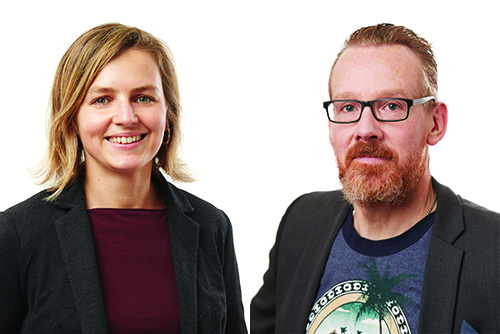Commitment, good contacts and language skills are key to how immigrants find a job
How can immigrants get a job more easily in Sweden? How important is the Swedish language and education level? And what is meant by a “luxury immigrant”? These are just some of the questions that researchers at Jönköping University are hoping to answer in an exciting new project.
Getting a job and being able to support oneself and create new social networks are seen as some of the most important factors for integration.
“From a European perspective, in Sweden we are not doing so well when it comes to integration, and this is partly due to the fact that we have fairly high thresholds for entering the labour market. This could also be due to the relatively large number of people who have arrived recently, and hence there being greater competition for jobs,” says Johan Klaesson.
Johan Klaesson is a professor of economics at Jönköping International Business School and one of the researchers involved in the project “Integration is a process – labour market careers of immigrants through sequential steps”.
The aim of the project is to survey how immigrants can get jobs faster. What steps are important in this process?
The process steps range from passivity to activity, depending on what the individual chooses to do; they might not do anything, they might be on parental leave, be studying Swedish, and then go on to complete compulsory school, upper secondary school, or move into higher education. They might work full-time, part-time or start their own business, as Johan Klaesson explains:
“The overarching question we want to answer is: What is the best way for an immigrant in Sweden to become integrated into Swedish society through work? What career paths lead to that goal and which don’t?”
"Unemployment is much higher among immigrants than among native Swedes... there is almost a 20% per cent gap..."
Statistics and interviews
The research is a collaborative project within Jönköping University involving Jönköping International Business School and the School of Health and Welfare jointly carrying out quantitative and qualitative studies. The project is funded by the Swedish Research Council for Health, Working Life and Welfare (FORTE).
For Johan Klaesson and his colleagues, all the information that is stored at Statistics Sweden (SCB) is a veritable gold mine:
“SCB has data about every person who is registered in the population register in Sweden. We have extracted datasets from their databases where we asked specific questions that we want answers to,” explains Johan Klaesson, who stresses that all the data that the researchers obtain is classified as confidential and cannot be tied to any individual.
In addition to the statistical data, his research colleagues at the School of Health and Welfare have carried out 19 in-depth interviews with immigrants about their pathways to the labour market and a job.
“Unemployment is much higher among immigrants than among native Swedes. In fact, there is almost a 20% per cent gap between these two groups. The interviews are an important complement since they help us understand what lies behind the figures. They also give us a deeper understanding of what the differences are between groups of immigrants,” explains Monika Wilinska, assistant professor at the Department of Social Work in the School of Health and Welfare.

Monika Wilinska and Johan Klaesson are part of a group of researchers working on the ”Integration is a process" project. (image: Patrik Svedberg)
Fully engaged
The people interviewed have all successfully gone through the integration process and have a job and a career that they are happy with. In total, 1000 randomly selected immigrants received the invitation to participate: 19 signed up for the interview.
“What was a little surprising, and very pleasing, was that everyone who signed up did so because they really wanted to be interviewed. They thought that the project was important and wanted to contribute with their experience in terms of what things are important to think about for successful integration into the Swedish labour market. The interviewees were deeply engaged and well acquainted with the issue and wanted to convey a message to the general public as well as to the political system,” says Monika Wilinska.
Passivity biggest stumbling block
The most important conclusion is that proactivity is crucial, according to Johan Klaesson.
“Although how active a person is can vary, it is always better to be active than to be passive. Even if you are studying or have a job that does not fully support you, it is important for the integration process that you do something.”
This is also confirmed by the interviewees.
“They took their own initiatives and fought long and hard to carve out a career that they can be proud of and find a workplace where they feel comfortable. Almost everyone stressed the importance of personal contacts, since it is often these contacts who can encourage an employer to consider prioritising an immigrant over someone born in Sweden. Performance is also highlighted as important for getting the opportunity to change jobs and achieve higher goals in working life. Many have experienced that they really have to prove that they are good at their job,” says Monika Wilinska.
From the interview transcripts...
INTERVIEWER: If you would recommend one thing, what would be the most important thing to think about for immigrants’ integration into the Swedish labour market?
INTERVIEWEE 1: Knowing the Swedish language and having contacts, (otherwise) regardless of what you can do, you don’t get the opportunity to demonstrate it, so it doesn’t help at all. But if you have contacts and can make yourself understood in Swedish, you can work out most other things. Then it’s … to do something good you need more. But to get to stay somewhere you have to know what you're doing. But to get that opening and opportunity, then I think it is, perhaps first contacts, and then the Swedish language.
INTERVIEWEE 2: If you want and say, “I want to be part of this society, absolutely”, then it's just about… there are those that come up with… “No, I can’t work here, no” and they always find reasons why they can’t work, and that means that they don’t want to, quite simply. If you find 100 reasons for "why I can’t do it, why I can’t do it", then it’s simply, you just don’t want to. If you don’t want to, then you cannot integrate. You can’t integrate if you’re sitting at home and so only spend time with your family.
"What we have seen is that a high concentration of immigrants in one area does not necessarily make the integration process more difficult."
Location matters
Another main focus of the researchers’ studies is location. As an immigrant, does it impact your prospects for getting a job if you end up in an area where there are many immigrants? And in that case, does it matter how many of your new neighbours have a job?
“What we have seen is that a high concentration of immigrants in one area does not necessarily make the integration process more difficult. It can actually be an advantage, provided the circumstances are right. If the area consists of a group where you feel a sense of belonging and where many are already in work, those contacts can support and spur you on in your career. This is interesting because in Sweden we often assume when we discuss this that a high immigrant density in an area is automatically a bad thing. But that doesn’t have to be the case at all. Internationally, for example in the USA, people think about this differently,” Johan Klaesson points out.

People from English-speaking countries, or other countries that Swedes would like to travel to or work in, often have a better chance of getting into the job market and are referred to as "luxury immigrants". (image: Unsplash / Massimo Virgilio)
Easier for "luxury immigrants"
On the other hand, what comes through very clearly in the interviews is that the immigrants themselves feel that where you come from is of great significance for opportunities to get jobs and make a career in Sweden. A common term used in the interviews was “luxury immigrants”.
“The fact that immigrants see differences among themselves, and that their opportunities differ depending on which group they belong to, is something that we should take into account in policy debate, where often all immigrants tend to be simply lumped together,” reflects Monika Wilinska.
The interviews show that there are differences between different immigrant groups. For example, between Europeans and those who are non-Europeans. The interviewees call people from English-speaking countries, or countries that Swedes like to travel to or work in, “luxury immigrants”.
“Depending on your origin, you are treated differently in the labour market. Education level and Swedish language skills are often talked about, but origin is also an important factor to take into account,” says Monika Wilinska.
“Impossible without the Swedish language”
The project’s quantitative material also confirms that education level and language skills in Swedish are important for the integration process in the labour market.
“The statistics speak for themselves. The more education you have, the easier it is to get a job,” says Johan Klaesson.
“The interviewees were also clear that without the Swedish language, it is virtually impossible,” adds Monika Wilinska. “They also emphasise the importance of knowing Swedish in the workplace from a purely social point of view. So, it’s not just a matter of needing to know Swedish to do their job – some of the interviewees have worked in places where English is the working language. But Swedish is still the language we use for our informal conversations during coffee breaks and lunch breaks. And if you can’t take participate in those conversations, you’re socially excluded. And if you’re socially excluded, then you can’t develop in your work or feel comfortable in the workplace.”

Education and language skills are important for the integration process in the labor market. "The further you have come in the educational steps, the easier it is to get a job," says Johan Klaesson. (image: Unsplash / Green Chameleon)
Mutual openness
The labour integration process is complex, and Johan Klaesson and Monika Wilinska are clear that the project will not be able to contribute with a ‘quick fix’ either.
“But we hope and believe that many of our conclusions will provide valuable knowledge to the various stakeholders involved in integration, in particular in adapting to different target groups,” says Johan Klaesson.
“What our interviewees are very clear about is that they see openness as extremely important. In order for the labour market to be able to take advantage of the experience and skills of immigrants, both sides must remain open to each other and share this responsibility. You cannot just blame the system and say that it’s got problems. It’s a bit more complicated than that,” says Monika Wilinska.
“By combining the different studies included in the project, we can shed light on some of that complexity," concludes Johan Klaesson.
More about the project and contact info
- Read more about Integration is a process – labor market careers of immigrants through sequential steps on the projects webpage. External link, opens in new window.
- Read also Sofia Wixe's blog post on Vertikals.se Opens in new window. (in Swedish) about the project.

- Associate Dean of Research
Professor Economics - Jönköping International Business School
- johan.klaesson@ju.se
- +46 36-10 1752
- Professor Social Work
- School of Health and Welfare
- monika.wilinska@ju.se
- +46 36-10 1215



